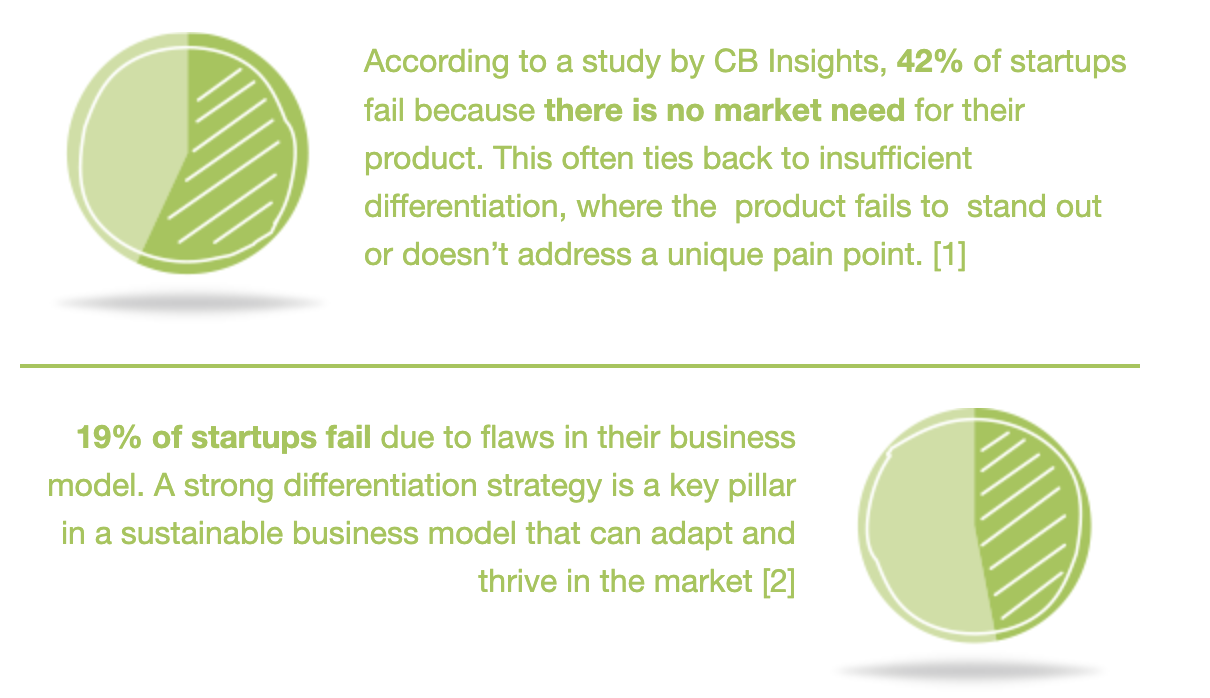Many startups believe that a unique technology is enough to differentiate them. However, for differentiation to be effective, it must be perceived and valued by customers.

True differentiation means meeting specific customer needs in ways that competitors do not. If the technology doesn’t provide a distinct advantage, being different becomes irrelevant. Differentiation is only successful if customers recognize and value the unique aspects of your technology. Even the most innovative technology may go unnoticed without clear communication of its benefits and value.
In the fast-paced world of tech startups, standing out can be both an opportunity and a challenge. When your product or service is truly unique, identifying competition and communicating your value proposition to potential clients can be tricky. Conventional competitive analysis methods may not apply, as your competition could range from indirect competitors to alternative solution providers that don’t immediately seem related.
However, being different means you are not just another face in the crowd. This distinction can be your greatest asset and allows you to carve out a niche in the market.
With uniqueness comes the responsibility of educating your potential clients. They need to understand why your solution is both different and better than anything else on the market. Clear, consistent communication through channels like newsletters can be pivotal. This helps build awareness and trust, guiding your audience through the unfamiliar aspects of your product or service.

Product differentiation tactics and value selling
Product differentiation leads to enhanced customer loyalty, higher price premiums, reduced price sensitivity, increased market share, and a competitive edge. Value-based selling strategies foster better customer relationships and result in more effective sales pitches, higher sales conversion rates, and long-term success.
Value selling depends on several aspects that can help tech startups identify and effectively implement differentiation tactics:
- Understanding your customer needs
- Creating unique value propositions
- Identifying competitive differentiation
- Effective messaging and positioning
To succeed in value selling, you must focus on knowledge-gathering through initiatives such as market analyses to understand customer needs. Building on this, and using competitive intelligence, your startup should then formulate unique value propositions (UVPs) to stand out in a crowded market and enable strategic positioning. Storytelling helps showcase a product’s real-world applications and creates stronger emotional connections with the target customers. A distinctive brand can also support higher pricing and attract investors by displaying a unique market position and potential for growth.
Let’s dive into these aspects one by one.
Market Analysis
Conducting thorough market research and analysis is essential for you to understand customers’ current needs and support your value-selling approach. In addition to understanding market needs and market-product fit, key advantages also include identifying opportunities for growth and expansion.
Creating Unique Value Propositions
Formulating UVPs is essential for your startup to stand out in a crowded market. A strong UVP allows you to strategically position yourself by defining your niche and competitive advantage. This positioning is critical to setting the business apart from others in the industry. UVPs also offer a clear and compelling message that can be leveraged across marketing and sales channels to entice and convert customers.
Identify Competitive Differentiation
Understanding how competitors position themselves in the market can help startups identify gaps and opportunities to uniquely position their offerings. By knowing what sets your business apart, you can better understand and cater to your target audience. This can make creating UVPs that resonate more strongly with potential customers easier. Moreover, identifying what makes your product or service unique compared to competitors allows you to emphasize these features in their marketing efforts, making their offerings more attractive to potential customers.
Storytelling
Storytelling helps showcase a product’s real-world applications, benefits and value, making it easier for customers to understand its value and how it can fit into their work or lives. By telling compelling stories, your startup can create strong emotional connections with audiences. This emotional engagement helps customers feel more connected to the brand, making it more memorable and relatable.
Brand Differentiation Strategies
A distinctive brand can support higher pricing by showcasing its unique value proposition, enabling your business to achieve better margins. Additionally, a clearly distinctive brand can draw in investors by displaying a unique market position and potential for growth, making your startup a more attractive investment opportunity.
“By focusing on delivering value and solving customer problems, startups can enhance customer engagement and loyalty. This proactive approach will not only help to differentiate you in the market but also creates a foundation for you to build long-term customer relationships.
Your uniqueness is your strength as a tech startup. While it may complicate competitive analysis and client understanding, leveraging effective communication strategies can turn these challenges into opportunities. Embrace your differences, educate your market, and watch your startup thrive.”
This can seem like a daunting task, and it can be hard to know where to start. We can help! Reach out to us via hello@moxworld.org for a no-obligation diagnostic call.
References
[1] researchgate.net – Analyzing Startups Failure Factors: Evidence from CB (March 2023)
[2] https://coreteka.com/blog/why-startups-fail/
more resources


